Initially presented at Historical Materialism in London, November 2018.
Last August, neo-nazis stormed the streets of Chemnitz, in former East Germany, chanting, “for every dead German, a dead foreigner” and “Foreigners out!” They chased brown-skinned people through the streets, beating those who they could catch, threw a journalist down a set of stairs, and smashed the windows of a Jewish-owned restaurant.
This was no spontaneous mob, but an organized manifestation. Using the death of Daniel H., a German-Cuban man killed in an altercation with a Syrian and Iraqi man at the town carnival, the far-right to neo-nazi spectrum mobilized en-masse, drawing over 6,000 people into the streets. On any other day, the tragic death of someone in a late-night fight would be a newspaper story, not a pogrom. But as we have seen over the past three years, fascists have seized on crimes committed by non-Germans in order to indict whole nationalities and whip-up anti-refugee and anti-immigrant violence.
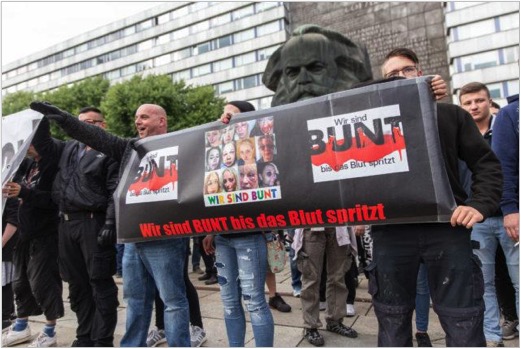
Soon, a rumor began to circulate that Daniel H. had been defending three German women against unwanted advances by Syrian and Iraqi men. Picked up by the conservative tabloid Das Bild, the fictitious insult of white German women at the hands of Arab men is a familiar and repeated trope. Leyla Bilge, far-right Alternativ für Deutschland member, demonstrated with a banner that stated: “we are not prey!” Nazis held a banner aloft that pictured women’s faces, beaten and bruised. It stated, “we are diverse until the blood splatters.” The AfD concurred, tweeting about protecting women from “knife migration.”
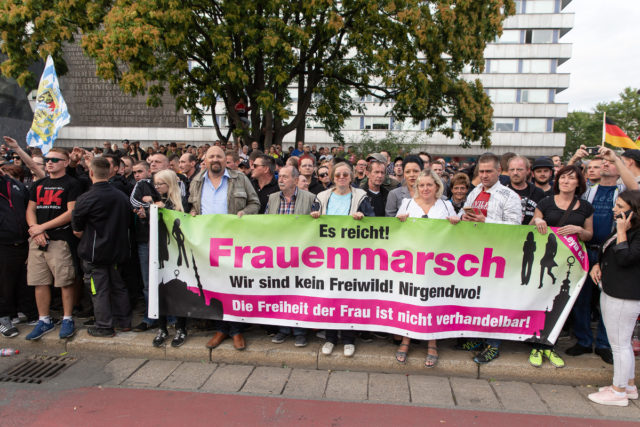
By seizing on or inventing [native] women as victims of foreigners’ attacks, Nazis develop a narrative that [white] German women need to be safeguarded from Muslim men, who pose a “pollution threat” to the pure German Volkskörper. This bloodline fantasy is an echo of Germany’s eugenicist and genocidal past, made present by the law of citizenship, which was defined by blood until 2000 The fantasy of protecting women becomes the fantasy of avenging all Germans, and every sexual assault by non-Germans becomes the next right-wing mobilization, as we have seen Kandel, Kölln, and Chemnitz.
Women have a particular role to play in these demonstrations, their presence at a softening the fascist intent. At the same time, by adopting the language of female self-empowerment and moral righteousness, they twist the demands of feminism –to be free from sexualized violence and harassment- towards xenophobic aims. This tactic has drawn on the historic women’s mobilizations we have seen around the world – from women’s strike to women’s marches to #metoo, and perverts the fight against sexism into a fight against foreigners.
This is why Alternativ für Deutschland organized two “Frauenmarschen” in Berlin demanding an end to “Sharia Law.” The first Frauenmarsch was surrounded and blocked by antifascists, delivering a defeat to the AfD. In reality, of course, the fascist street movement has few women supporters- most participants in the Women’s March were men. Nor do women support the AfD at the ballot box-twice as many men support the AfD than women. Outside of a few prominent leaders (Alice Weidel, Beatrix von Storch), the AfD has the lowest number of elected women of any party.
I use this example of racialized sexism as entry into one of the tenets of femonationalism, or what Sara Farris (2017) defines the deployment of “women’s rights” by the state, liberal feminist organizations, far-right and even fascist groups towards anti-immigrant, and specifically anti-Muslim means. The power of the far-right instrumentalization feminist demands is that it creates a bridge to bourgeois racism, which has long conceptualized non-Western, non-EU men as uncivilized, sexist, misogynists, in need of enlightening – or deportation.
Left-wing women’s organizations have rejected this instrumentalization, noting that sexualized violence and sexual harassment have nothing to do with nationality. Anyone who has ever been to Oktoberfest knows that sexism does not have to be imported – it is long here.
The instrumentalization of ‘in the name of women’s rights’ occurs at almost every level, from government policy, state discourse, among liberal feminists, and in court rulings. Islam is a particular target and is consistently discussed in negative terms, defined as backward, hostile, threatening, or irrational. Hakan Tosuner describes the “integration debates” as “an act of domestication for a problematic population.” Domestication connotes taming wild animals. This is echoed by Thilo Sarrazin, a well known SPD member, on tour for his latest book: “Hostile Takeover: How Islam hinders progress and threatens society”. Describing Islam as “an ideology of violence disguised as religion,” Sarrazin argues that if Europe doesn’t take swift action to halt Muslim migration into the EU, European society will ultimately be enveloped and destroyed by Islam. A particular irony is the claim that Muslim refugees are ‘importing’ anti-Semitism into Germany even as the neo-Nazis gather.
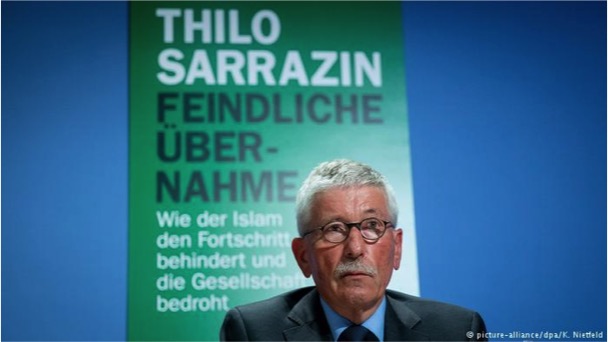
While Muslim men are conceptualized as violent and sexualized extremists by the far-right, the German state sees Muslim women are seen as passive victims in need of saving. Part of this saving includes forced unveiling, a common trope throughout Europe which has become a powerful image in Germany. This unveiling on colonial traditions wherein Europe is conceptualized as a civilizing and egalitarian force to the non-EU/non-western arrival.
Most politicians – from Angela Merkel to the SPD- have supported a ban on headscarves wherever possible. Local court cases have upheld the so-called religious “neutrality” law, which bans state employees from wearing religious symbols at work, from yarmulkes to crosses to hijabs. This is Islamophobia masquerading as secularism which means a de facto work ban for millions of women who choose to wear the hijab. Most recently, so-called feminists like Alice Schwarzer and the organization Terres de Femmes defended the hijab ban, calling for it to be extended to school age children. A notable exception has been the left party- Christine Buchholz and Cornelia Möhring- who have defended a woman’s right to choose their clothing.
In short, we can see implicit or unintended alliances between “liberal” German forces and the far-right as they make common cause against the so-called “Islamization of Germany.” This should begin to point us towards an appropriate response: our movement must demand self-determination and bodily autonomy against a hostile and colonial state.
AfD claims demographic crisis to stimulate forced reproduction
AfD party program spells out a regressive, reactionary agenda for women, which includes a ban on headscarves, an end to gender quotas in the workplace, an end to transgender protection. At the same time, marriage and childbearing are incentivized and abortion restricted, pulling on policies straight out of the Third Reich in order to increase the German [read, white] population. The far-right and neo-fascist forces see non-white immigrant woman’s womb as a threat to Germany. Section 6.2 of AfD’s political program, titled “Larger Families instead of Mass Immigration” warns that immigrant families with higher birthrates than German families will “hasten the ethnic-cultural changes in society.” AfD’s answer to this “problem” is straight out of the fascist playbook: “Germany’s negative demographic trend has to be counteracted… The only mid- and long-term solution is to attain a higher birth rate by the native population by stimulating family policies.”
To do this, the AfD opposes abortion and seeks to maintain the two constitutional paragraphs which restrict and limit abortion: Paragraph 218 and 219. Although abortion is a common procedure in Germany, it remains technically illegal under Paragraph 218, where it is listed next to murder and manslaughter. Only through a subsequent amendment is abortion permitted, granted specific requirements are met.
Paragraph 219a, passed in 1933, criminalizes advertising abortion services. The offense is punishable with up to two years in prison for anyone who publicly “offers, announces or recommends services for pregnancy termination.” What the law means in practice is that doctors are forbidden from listing abortion services or factual information online. Dr. Kristina Hänel, a target of the anti-abortionists, was charged with breaking 219a and fined 6,000 euros for offering information on abortion online. In essence, information on ending a pregnancy – the basis for self-determination, remains taboo.
Lest you think Germany is a sexually repressed or victorian country- you can find advertisements on the street for anything from dildos to erotic massage to vasectomies – sometimes all three – but not abortions.

The AfDs defense of the 219a is particularly chilling, given its eugenicist origins, part of the Nazis’ “racial hygiene” program that sought to forcibly increase the “Aryan” population and decrease that of the “destroyers of the culture,” such as Jews, foreigners, and “individuals unworthy of life.” Shortly after its introduction in 1933, the Berlin Council of Physicians argued that practice of abortion “shall be exterminated with a strong hand … proceedings will be taken against every evil-doer who dares to injure our sacred healthy race.” Meanwhile, Hitler awarded women with four or more children the Cross of Honor of the German Mother. Nazi propaganda determined that “to be a wife and mother is the German woman’s highest essence and purpose of life.”
This invocation of “racial hygiene” is visible in Alternative for Germany’s election poster, which features a white pregnant woman’s midsection and the caption, “New Germans? We’ll make our own.” At the same time, Andre Wendt of the AfD in Saxony made an inquiry into the cost of sterilizing “unaccompanied refugee minors.”

These struggle to remove Paragraph 219a from the German constitution represents the first renewal for the abortion rights since reunification. Hundreds of thousands signed petitions to defend Dr. Hänel, and dozens of demos helped to pressure the Social Democrats, who have not pursued removal while in coalition with the CDU. As the centrist coalition breaks apart, and polarization continues, we can expect this struggle to sharpen.
The fight to remove paragraph 219a is a demand for bodily autonomy and self-determination that puts women in direct confrontation with the state to control our own bodies. The same logic of bodily autonomy and self-determination is present in every fight for the right to wear the hijab, to flee unsafe conditions, to demand higher pay, and an end to sexualized violence.
While we have seen the meteoric rise of the far-right over the past three years and an increase in fascist violence, we have also seen- along with the rest of the world- a rise in women’s organizing and struggle. Women*-led struggles have the potential to challenge both far-right and liberal forms of femonationalism and become sites of native-born and immigrant solidarity. To do so, the growing movement must consciously build anti-racist and anti-imperialist feminism. This means building a left that imagines the working class, not as a white man in a hard hat but the non-white, immigrant woman cleaning hotel rooms or the Muslim teacher barred from the classroom. This is the lesson for Sahra Wagenknecht, co-chair of Die LINKE, who has fixated on winning back AfD voters by dropping language anti-racism or anti-sexism, instead putting forward economistic demands and immigration caps. This is strategy will fail.
While Germany calls itself “Kein Einwanderungsland” (a non-immigrant country), it relies on immigrant labor. Over 10 million people, or 13% of the population, are immigrants. One out of every five Germans has an immigrant background. And because Germany faces a major labor shortage in areas such as construction, administration, transportation, technology, and care work- a labor shortage that is projected to grow over the next ten years, we can only expect this percentage to grow. A large section of this workforce is immigrant women, shuttled into low-paid care work which has suffered the brunt of neoliberalism. This is where we have seen recent strikes for higher hospital staffing in 2015 and 2017; daycare workers striking for higher pay in 2018, and recent dispute of cleaning staff fighting for a winter bonus.
The new feminist movement is also intertwined with growing consciousness about racism and discrimination. We see glimpses of this in the recent #MeToo movement, which moved from sexual harassment to racism. Using the hashtag #MeTwo (Two in reference to two cultures) Germans of immigrant descent cataloged their experiences of everyday racism in a country that defined citizenship based on blood until 2000. German-ness remains linked with whiteness and Christianity. Brown-skin or non-white features signify foreignness, even for third-generation Turkish, Vietnamese, or Angolans, while segregated schools, higher education, and jobs maintain this distinction. An example of this duality is German-Turkish football star Mesut Özil, who quit the German National team this summer out of disgust with racism, declaring: “When we win, I am German. When we lose, I am an immigrant.”
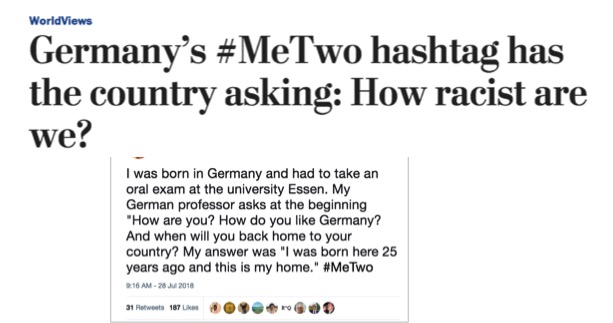
This is our task: to build an anti-capitalist, antiracist and anti-colonial feminist movement that organizes Germany’s growing immigrant class. This weekend, over 300 women* are meeting in Göttingen to plan the German version of the International Women’s Strike for March 8, 2019. Although political questions and fights remain, the strike form- which is inherently anti-capitalist- demonstrates the potential for feminism to break with liberal forms of femonationalism by making visible the classed experience of women – women who are not passive, and not in need of saving, but who are saving themselves.
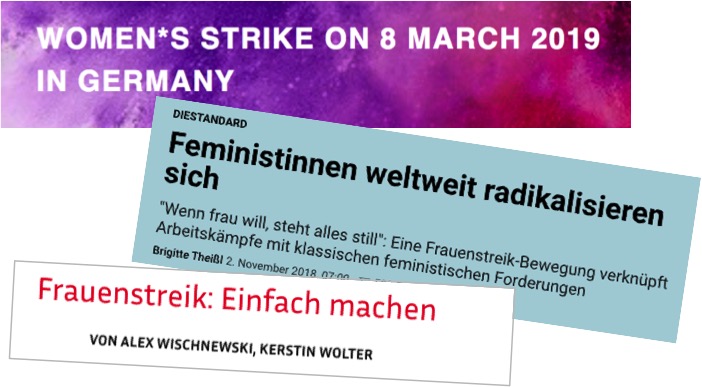


If this was your talk in London I know it was excellent. A comprehensive examination of a difficult issue.